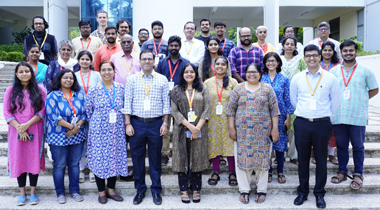
Events
Health Analytics Workshop on Modelling Neglected Tropical Diseases in India
August 30th - September 1, 2023
The Health Analytics Workshop on Modelling Neglected Tropical Diseases (NTD) in India was the second in a series of workshops focussing on NTD modelling organised by NDMC, IIT Bombay. The workshop conducted in collaboration with Prof. Luc Coffeng and Dr. Ananthu James, Erasmus MC, The Netherlands, representing the Neglected Tropical Disease Modelling Consortium (NTDMC), was an optimal combination of practical hands-on sessions and informative presentations by program leaders and modelling experts.
Of the 16 participants who attended the workshop, more than half were PhD candidates or research associates from NDMC, IIT Bombay. The remaining participants were from ICMR-Vector Control Research Centre, International Institute for Population Sciences, Vellore Institute of Technology-Chennai, and CSIR-Indian Institute of Chemical Technology.
On the first day, Prof. Souvik Banerjee, Department of Economics and principal investigator of the NTD group of NDMC, started the workshop with a brief introduction. Dr. S. Subramanian, Retd. Senior Deputy Director, ICMR-Vector Control Research Centre, delivered a plenary talk on “LYMFASIM, a Simulation Model for Lymphatic Filariasis Transmission and Control”, providing a background on lymphatic filariasis (LF), the need for a simulation model, and elaborating on the development and quantification of LYMFASIM and its application. This was followed by a presentation on “Visceral Leishmaniasis and its Control in India” by Prof. Luc Coffeng, which provided a background on the biology and clinical aspects of visceral leishmaniasis (VL), vector control, and examples of questions that models have attempted to address. This session provided the context for the following sessions on “Developing Compartmental Models” and “Formulating a Model-Answerable Question” by Prof. Luc Coffeng. Details of all the interactive hand-on sessions conducted by Prof. Luc Coffeng and Dr. Ananthu James can be found here.
The second day began with a plenary session on “Lymphatic Filariasis: The Journey towards Elimination” by Dr. Tanu Jain, Director National Center for Vector-Borne Diseases Control (NCVBDC), Directorate General of Health Services, Ministry of Health & Family Welfare (MoHFW), Government of India. The presentation provided an overview of the national programme for the elimination of LF, recent achievements of the programme, as well as the scope of modelling. Next, Dr. Vinod Choudhary, Medical Officer, NCVBDC, gave a presentation on “Kala-azar: Towards Elimination”, which included the initiatives under the kala-azar elimination programme, the progress made so far, a summary of the Kala-azar Management Information System (KAMIS), as well as the scope for modelling. These presentations were followed by practical coding sessions for the remainder of the day.
On the final day, Prof. Luc Coffeng and Dr. Ananthu James reviewed “More Complex Modelling Methods” and reflected on the “Lessons Learnt” from the hands-on sessions. Dr Bhupendra Tripathi, Country Lead - Elimination Programs-Neglected Tropical Diseases, Bill & Melinda Gates Foundation, delivered a presentation on the “Recent Policy Changes for the LF elimination Program”. This was followed by presentations on “Compartmental Models for Lymphatic Filariasis Transmission” by Prof. Mithun Mitra, Department of Physics, IIT Bombay, and “Machine Learning Basics Through Data Stories in Python” by Prof. Ganesh Ramakrishnan, Co-PI NDMC, Department of Computer Science and Engineering, IIT Bombay.
Overall, the workshop was very well received by the participants. A post-workshop survey indicated that most of the participants found the presentations by program leaders and modellers very informative and helpful from the modelling perspective. Furthermore, the participants found the coding sessions very beneficial. Here is what some of them had to say:
"I liked the set-up of the coding sessions. Prof. Luc suggested that we come up with some problems and motivated us to use the codes provided. In this way I could learn the codes and start thinking about problem solving using them. I look forward to using this learning in my future research.” - Dr. Indrajit Ghosh, IIT Bombay
“The coding sessions were meticulous. These sessions provided a structured environment for the participants, encouraging collaborative discussions and brainstorming potential mathematical modelling problems. These sessions facilitated the amalgamation of diverse modelling perspectives, furthering a more comprehensive learning.” - Dr. Esha Kashyap, IIT Bombay
“The coding sessions helped me in understanding the theoretical as well as the computational aspects of compartmental modelling” - Dr. Sagar Pandhare, IIT Bombay
“I had a thorough understanding of coding thanks to the guidance of the professors. I will apply this knowledge to develop my own models” - Karthik. A, VIT-Chennai
“The approach was unique and thought provoking. Trying to model our own research questions made the session very interesting.” - Dr. Divya Kappara, IIT Bombay
